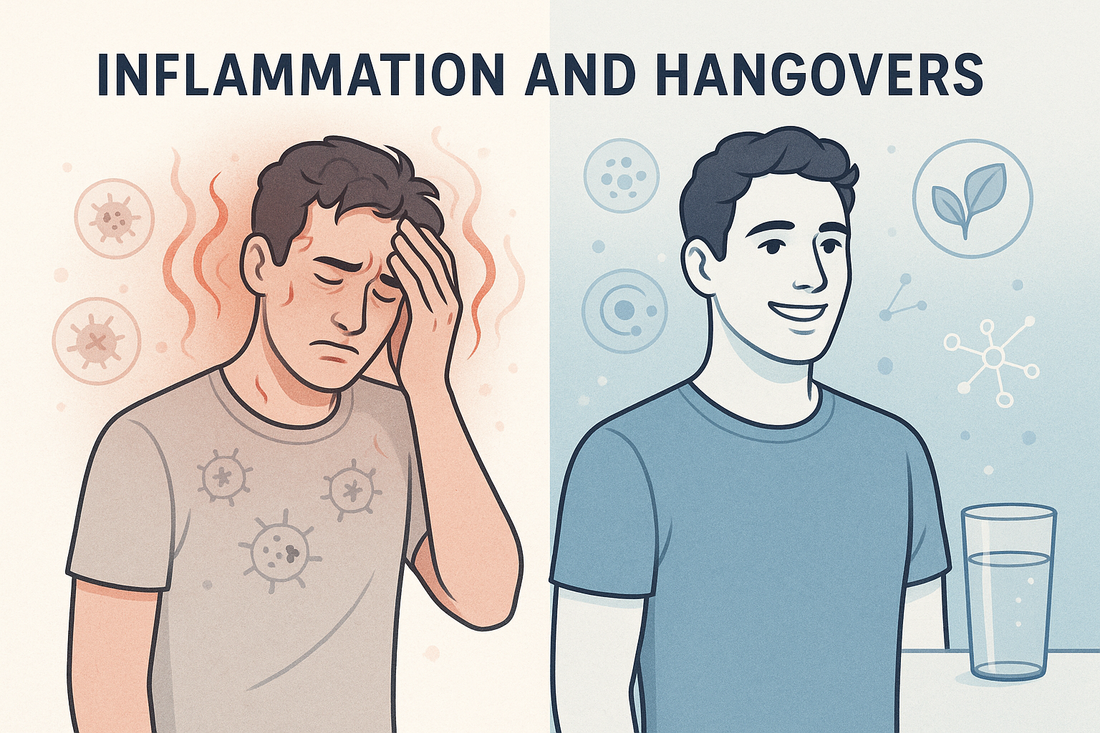
Inflammation and Hangovers: The Hidden Connection
Most people think hangovers are just about dehydration or poor sleep. While those factors matter, there’s another big player behind the pounding headaches, sore muscles, and brain fog: inflammation. In fact, growing research shows that the body’s inflammatory response is one of the key reasons hangovers feel so brutal.
In this article, we’ll dive into the science of alcohol-induced inflammation, explain how it affects your body and brain, and share practical strategies for reducing it so you can recover faster.
What Is Inflammation?
Inflammation is part of your body’s natural defense system. When you get a cut, fight an infection, or strain a muscle, your immune system sends out chemical messengers called cytokines. These trigger swelling, heat, and immune activity to repair damage and fight off invaders.
According to the National Library of Medicine, inflammation is essential for healing — but when it’s excessive or misdirected, it can make you feel unwell. And that’s exactly what happens when alcohol is involved.
How Alcohol Triggers Inflammation
Alcohol doesn’t just affect your liver and brain — it stimulates your immune system in ways that increase inflammation. Here’s how:
- Immune activation: Alcohol is processed as a toxin. As your liver works to metabolize it, immune cells release cytokines, creating a low-grade inflammatory response.
- Gut disruption: Alcohol irritates the gut lining and alters gut bacteria. This can allow tiny amounts of bacterial toxins (endotoxins) into the bloodstream, which the immune system reacts to strongly.
- Oxidative stress: Alcohol metabolism produces free radicals, unstable molecules that damage cells and increase inflammation.
- Sleep disruption: Poor sleep from alcohol increases cortisol, the stress hormone, which is linked to inflammatory responses.
Put simply: when you drink, your body treats it like an invader. The result is a wave of inflammatory activity that lingers into the next day.
Why Inflammation Feels Like a Hangover
The typical hangover symptoms you know all too well — headache, muscle soreness, fatigue, and brain fog — overlap closely with signs of inflammation. Here’s why:
- Headaches: Cytokines dilate blood vessels and sensitize pain receptors, making headaches more likely.
- Fatigue: Inflammatory signals interfere with mitochondria (your cells’ energy factories), lowering energy production.
- Muscle aches: Cytokines increase muscle sensitivity, leading to soreness similar to what you’d feel after a tough workout.
- Brain fog: Inflammation affects neurotransmitters like serotonin and dopamine, clouding concentration and mood.
If hangovers feel like your body is fighting something, it’s because, in a way, it is.
Hangover Inflammation vs. Regular Inflammation
It’s important to note that hangover inflammation is typically short-term. Once alcohol is metabolized and your body clears out inflammatory signals, symptoms fade. However, frequent drinking can contribute to chronic inflammation, which is linked to long-term health issues like cardiovascular disease, digestive disorders, and weakened immunity.
This is why recovering properly isn’t just about feeling better — it’s also about giving your body the chance to reset.

Strategies to Reduce Inflammation After Drinking
The good news? You can take steps to calm inflammation and speed up recovery. Here’s what helps:
1. Hydrate with Electrolytes
Hydration supports circulation and helps flush out inflammatory byproducts. Electrolytes like sodium, potassium, and magnesium make rehydration more efficient and reduce fatigue.
2. Eat Anti-Inflammatory Foods
Skip greasy fast food and opt for nutrient-rich meals that calm inflammation:
- Fruits: Berries, oranges, and cherries are loaded with antioxidants.
- Leafy greens: Spinach and kale provide vitamins and minerals that reduce oxidative stress.
- Omega-3 fats: Salmon, walnuts, and chia seeds combat inflammation at the cellular level.
- Spices: Ginger and turmeric are well-known for their anti-inflammatory properties.
3. Move Your Body (Gently)
While a hard workout might make things worse, light activity like walking or yoga increases circulation, lowers cortisol, and helps clear out inflammatory chemicals.
4. Prioritize Sleep
Recovery happens during rest. A short nap or prioritizing an early bedtime the next night helps your body return to balance.
5. Avoid More Alcohol
Hair-of-the-dog drinks may temporarily numb symptoms but prolong inflammation. Let your body detox fully instead.
Prevention: Smarter Drinking Habits
If you want to avoid intense inflammatory hangovers in the first place, these habits can help:
- Eat a balanced meal with protein and healthy fats before drinking.
- Alternate alcoholic drinks with water to reduce immune stress.
- Limit sugary mixers, which worsen inflammation and blood sugar crashes.
- Set a personal limit to avoid overwhelming your system.
Moderation and preparation can dramatically reduce how hard inflammation hits the next day.
FAQs About Hangover Inflammation
Why do I feel sore after drinking?
Alcohol triggers cytokine release and increases muscle sensitivity, leading to soreness similar to what you’d feel after a workout.
Can inflammation cause hangover brain fog?
Yes. Inflammatory chemicals affect neurotransmitters like dopamine and serotonin, reducing focus and altering mood.
How long does hangover inflammation last?
For most people, inflammatory effects peak the morning after drinking and fade within 24 hours. Heavy drinking may extend the timeline.
Does taking pain relievers reduce inflammation?
Over-the-counter medications like ibuprofen can reduce inflammation, but they may stress the stomach and liver when combined with alcohol. Use caution and consult a doctor if unsure.
The Bottom Line
Hangovers aren’t just about dehydration or poor sleep — inflammation is a hidden but powerful contributor. Alcohol activates the immune system, triggers cytokines, and causes oxidative stress, all of which add up to headaches, fatigue, soreness, and brain fog.
The best recovery plan is one that calms inflammation: hydrate with electrolytes, eat anti-inflammatory foods, move gently, and prioritize rest. And if you want extra support, an electrolyte + caffeine blend like Rally Reset can help you rehydrate and recharge as your body resets.



